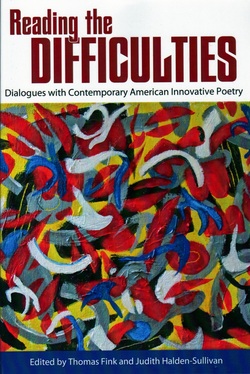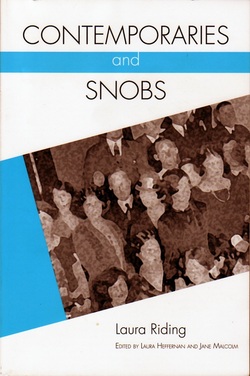
Reading the Difficulties is another spring 2014 release in the Modern/Contemporary Poetics series co-edited by Charles Bernstein and Hank Lazer. It is less a book about how to read ‘difficult’ contemporary poetry than one that presents examples of readers doing that. The subtitle, “dialogues with contemporary American innovative poetry,” suggests that “reading” can involve having “dialogues” with poems, and is a fair description of most of the contents. Two of the twelve essays are on Canadian poets, bpNichol and Lisa Robertson, who appear to have become honorary Americans for this occasion. Or perhaps “American” has been unconsciously redefined here as referencing North America – the rapid globalization of literary distribution and creation has complications for everyone. Also frequently cited here is a third Canadian, Steve McCaffery.
Difficult not to notice is the sometimes awkwardly close connection between the book and series co-editor Bernstein, who rather famously linked the word ‘difficulty’ to his own writing in his 2011 collection The Attack of the Difficult Poems. Much of the first third of this book reads like a tribute that important book. The lead-off contribution is his 2006 poem “Thank You for Saying Thank You,” which begins “This is a totally / accessible poem.” The fourth essay is a comparison by Stephen Paul Miller of Bernstein and Walter Benjamin as radical secular Jewish poets. Thirty-three mentions of Bernstein are listed in the index (mostly in the first 50 pages), more than double those of any other writer except for fellow Language poet Ron Silliman who receives 23.
The arguments of most of the contributors indeed have their roots in Bernstein’s assertions over the years in work such as The Artifice of Absorption (1987) and Content’s Dream: Essays 1975-84 (2001) against the reduction by readers and teachers of literary works to their “content” – a scandalizing argument that has paralleled in the US poetry scene the one which I introduced to the Canadian Literature criticism scene in 1974 with my (“vastly influential” according to the Oxford Companion [one hopes!]) essay “Surviving the Paraphrase.” Paralleled with rather more panache, disruptive force and literary consequence, I would say. Here is some of Bernstein’s “artifice of absorption” argument against paraphrase, i.e. against throwing away a text’s materiality while “absorbing” its imagined/abstracted “meaning”:

 RSS Feed
RSS Feed